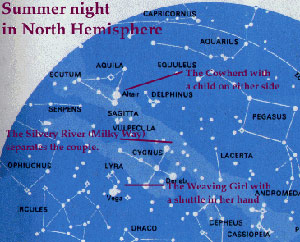July:Chinese Valentine's Day Comes(情系七夕)三
(单词翻译:单击)
 Gaze up to where the Milky1 Way (or "Heavenly River" in Chinese) traverses the night sky and you will see a constellation2 of five small stars on the east bank. This is Vega, also called the Weaving Maid or "Zhi Nu." Opposite to her, on the distant western bank, is Altair, also known as Cowherd or "Niu Lang ", shining brilliantly throughout the ages -- lonely and waiting.
Gaze up to where the Milky1 Way (or "Heavenly River" in Chinese) traverses the night sky and you will see a constellation2 of five small stars on the east bank. This is Vega, also called the Weaving Maid or "Zhi Nu." Opposite to her, on the distant western bank, is Altair, also known as Cowherd or "Niu Lang ", shining brilliantly throughout the ages -- lonely and waiting.
Since Vega is the fifth brightest star in the sky, it is therefore very easy to spot on a summer night. Vega is 16 times bigger than the sun and its surface temperature tops 10,000 degrees Celsius3. Vega is also 25 times brighter than the sun and 25 light years away from Earth.
Altair, as the 11th brightest star in the sky, is also easy to spot on a summer night. Altair is four times bigger than the sun at a surface temperature of about 8,000 degrees Celsius. It is 11 times brighter than the sun and 17 light years away from Earth.
Two stars Alshain and Tarazed, located on each side of Altair, are said to be the cowherd's two children. Since the distance between Vega and Altair is 16 light years, they cannot meet in the sky. In the story, the magpie4 bridge allowed the Weaving Maid and cowherd to meet. The festival
The festival
On Chinese Valentine's Day, couples go to matchmaker temples to pray for everlasting5 love and marriage. Even single people will frequent the temple for luck in love.
Chinese Valentine's Day is also called "The Daughter's Festival". Long ago, Chinese girls aspired6 to becoming skilled craftswomen like the Weaving Maid. This skill was considered essential to their future as wives and mothers. On that night, unmarried girls prayed to the Weaving Maid star for the special gift. When the star Vega was high up in the sky, girls performed a small test by placing a needle on the water's surface: If the needle did not sink, the girl was considered to be ready to find a husband. Once a year, on this day, girls could wish for anything their hearts desired.
In some Chinese provinces, people believe that decorating an ox's horns with flowers on Chinese Valentine's Day will ward7 off disaster. On the night of Valentine's Day, women wash their hair to give it a fresh and shiny look; children wash their faces the next morning using the overnight water in their backyards for a more naturally beautiful appearance; and girls throw five-colored ropes made during the Chinese Dragon Boat Festival on the roofs so magpies8 can use them to build the bridge.
 收听单词发音
收听单词发音
1
milky

|
|
| adj.牛奶的,多奶的;乳白色的 | |
参考例句: |
|
|
|
2
constellation

|
|
| n.星座n.灿烂的一群 | |
参考例句: |
|
|
|
3
Celsius

|
|
| adj.摄氏温度计的,摄氏的 | |
参考例句: |
|
|
|
4
magpie

|
|
| n.喜欢收藏物品的人,喜鹊,饶舌者 | |
参考例句: |
|
|
|
5
everlasting

|
|
| adj.永恒的,持久的,无止境的 | |
参考例句: |
|
|
|
6
aspired

|
|
| v.渴望,追求( aspire的过去式和过去分词 ) | |
参考例句: |
|
|
|
7
ward

|
|
| n.守卫,监护,病房,行政区,由监护人或法院保护的人(尤指儿童);vt.守护,躲开 | |
参考例句: |
|
|
|
8
magpies

|
|
| 喜鹊(magpie的复数形式) | |
参考例句: |
|
|
|




